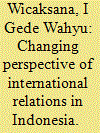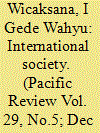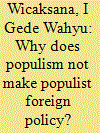| Srl | Item |
| 1 |
ID:
159325


|
|
|
|
|
| Summary/Abstract |
This article explores the development of international relations (IR) in Indonesia with special focus on the changing trends in its theoretical perspectives. It argues that the academic works examined reflect the ways in which Indonesia’s IR scholars perceive and theorize the nature of the dynamics of external political environments and their connections to the state’s foreign relations. The argument is elaborated in two related parts. The first section discusses the theoretical perspectives that developed during the Cold War period, which focuses on the propensity toward historical realism and regionalism. The second part of the discussion examines recent developments in which Cold War perspectives have been reconsidered, and in many respects modified into three new categories of theoretical thinking, namely reform, resistance, and eclecticism. The changing theoretical trends reveal that Indonesia’s IR scholarship is open and innovative. The conclusion comments on the development of the Indonesia’s IR.
|
|
|
|
|
|
|
|
|
|
|
|
|
|
|
|
| 2 |
ID:
148310


|
|
|
|
|
| Summary/Abstract |
Realism has been the dominant conceptual approach to studying Indonesian foreign policy. This article, however, considers realist analyses to be insufficient since their emphasis on the struggle for power and security in the system of states has led to the neglect of the importance of perspectives which focus on order. To fill the gap it then intends to apply the English School perspective which focuses on the concept of international society to trace the nature and function of Indonesian foreign policy. Two cases are examined, including the Asian African Conference and Association of South East Asian Nations, to demonstrate the relevance of international society for policy ideas and action. The central argument is that the Indonesian elite worldview indicates that the creation and maintenance of order in international societies are ones which are prominent objectives legitimizing the conduct of Indonesia's external relations.
|
|
|
|
|
|
|
|
|
|
|
|
|
|
|
|
| 3 |
ID:
188428


|
|
|
|
|
| Summary/Abstract |
The consequences of populism on foreign policy have been a rising topic of academic inquiry in recent years. The latest literature exposes diverse propensities in the state governments’ international behaviour led by populist leaders. In comparison, foreign policies of populists in the Americas and Europe exhibit anti-elitism and anti-pluralism toward the outside world. Those in Asia tend to be populist domestically, not in foreign policy. This article focuses on the foreign policies of Asian populist government leaders and addresses the question as to why are their foreign policies sterile from populism? It presents the case of Indonesia under President Joko Widodo (Jokowi). The argument is that the enduring pragmatism and domestic constraints have hindered Jokowi's populist motive from shaping the role of the state foreign policy as the defender of the suppressed people against the repressive elite. Hence, Jokowi is unable to make any substantial change to the foreign policy of his non-populist predecessors, and he has to maintain Indonesia’s traditional foreign policy pillars. Nevertheless, the case of Jokowi's Indonesia can open up the space to challenge the established Euro-American scholarship advancing a positive connection between leaders’ populism and foreign policy.
|
|
|
|
|
|
|
|
|
|
|
|
|
|
|
|